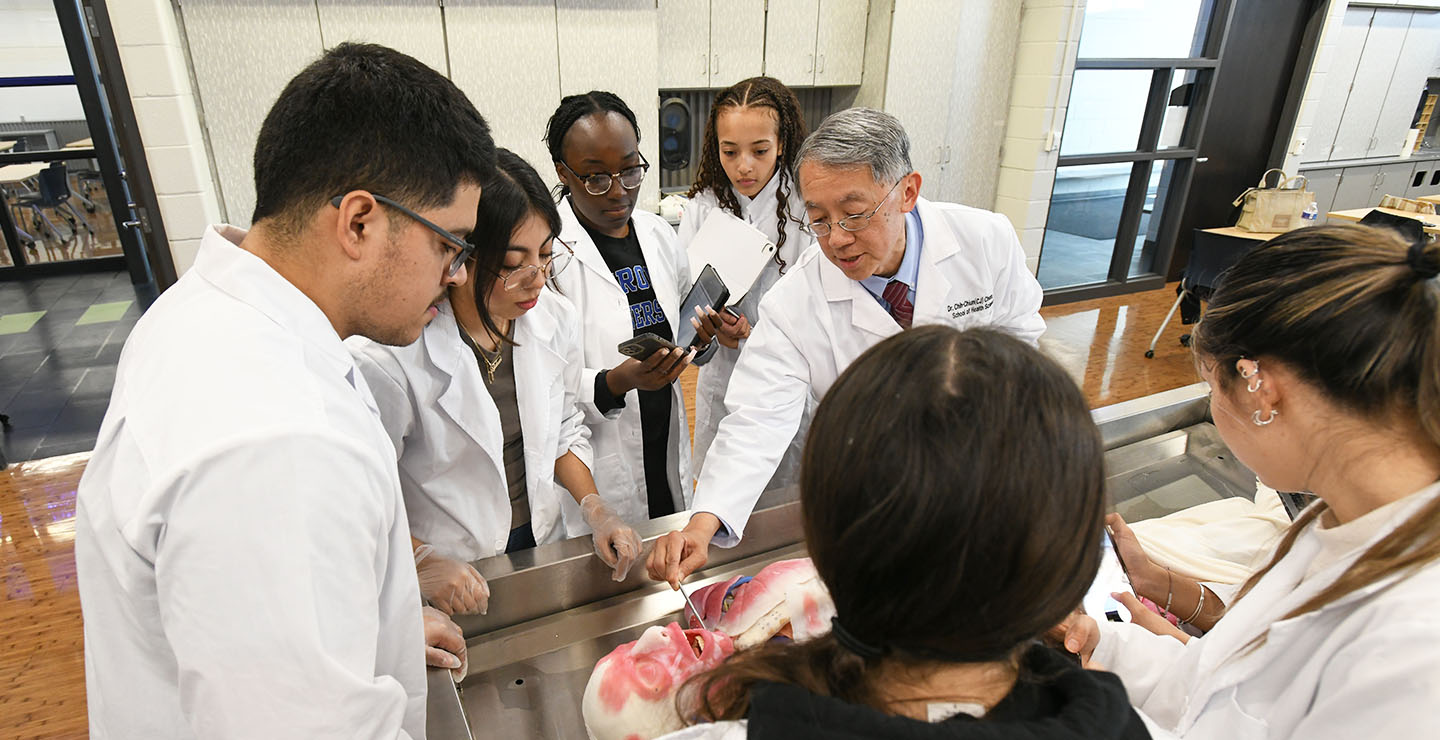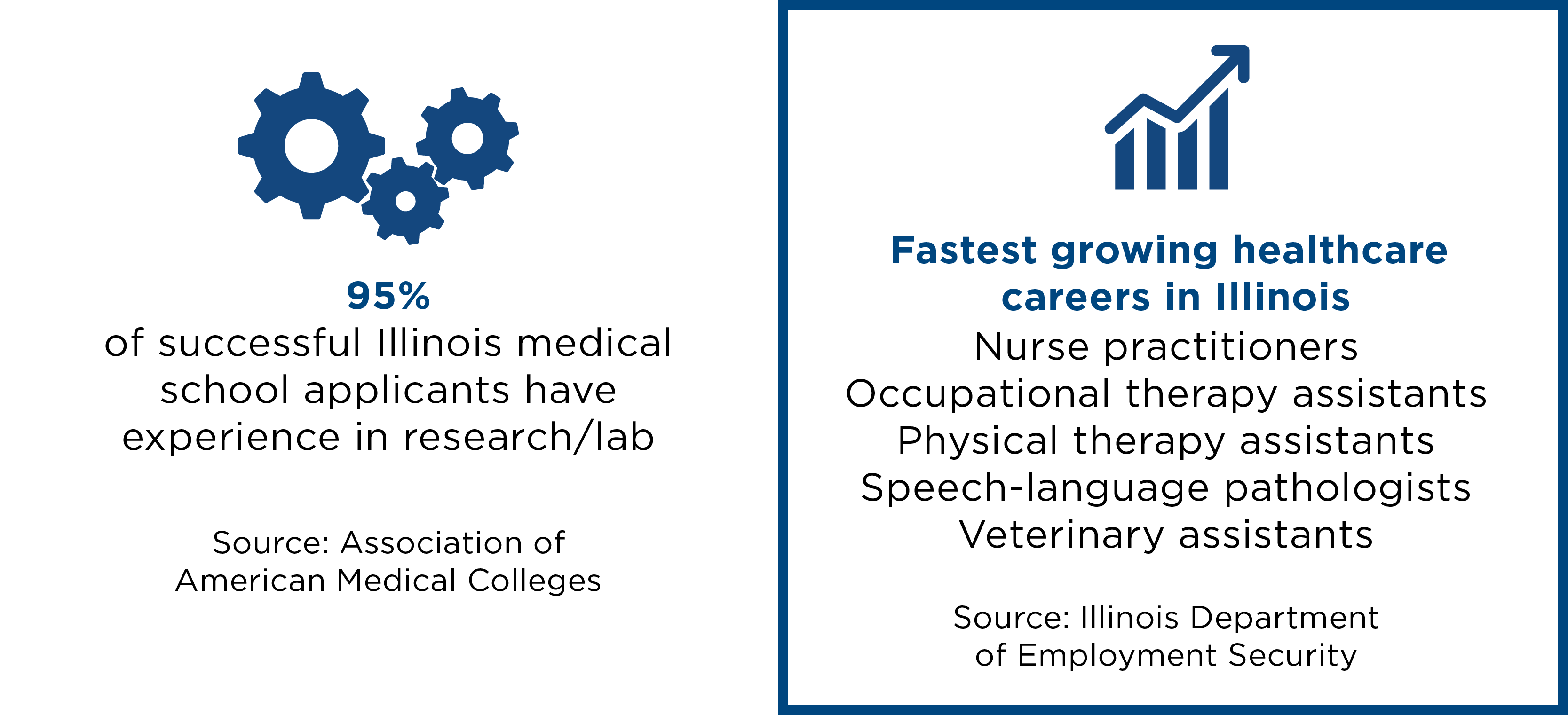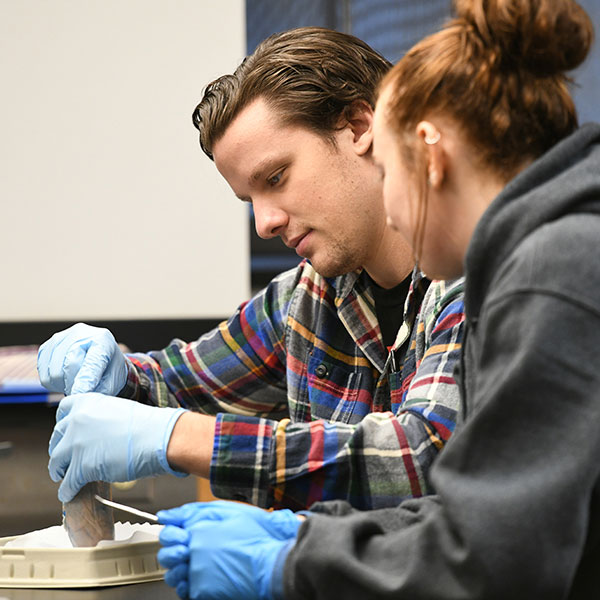Health Science (BS)

Why a Health Science major?
Are you concerned for the well-being and health of others? Do you want a broad-based undergraduate degree that can give you a wide variety of career options in the fast-growing healthcare industry? If you answered yes to these questions, then majoring in Health Science could be for you. A Health Science major is rewarding for students with a passion for both science and service. It can lead to a well-paying job right out of school and also prepare you for graduate or professional school programs in the medical field.

AU partners with UIC to offer students a direct path to MS in Medical Biotechnology
Aurora University has entered into an agreement with the University of Illinois College of Medicine Rockford to guarantee a direct path to admission into the Master of Science in Medical Biotechnology program.

How can I work in healthcare without being a doctor?
If you are interested in healthcare — in understanding how the body works and learning about ways to help people who are sick or injured — there are many career paths to consider beyond becoming a doctor.
The Bachelor of Science in Health Science major at AU provides highly motivated students with foundational knowledge to practice in the ever changing world of healthcare. The Health Science major is designed to empower you to not only become a healthcare practitioner, but to transform the healthcare industry. The curriculum will prepare you to become a culturally competent, interdisciplinary, evidence-based practitioner.
As a Health Science major, you may choose to take courses in a pre-health professional program to prepare yourself for medical school or advanced studies in healthcare. The pre-health professional programs available include:
- Chiropractic
- Dentistry
- Medicine
- Occupational therapy
- Optometry
- Pharmacy
- Physician’s assistant
- Podiatry
The Health Science major will also prepare you for advanced graduate degrees in public and community health, healthcare administration, and other medical programs.
You will explore the world of healthcare through applied coursework in epidemiology, healthcare systems, and evidence-based practice. If you enroll in a pre-professional program, you will experience laboratory courses in biology, chemistry, and physics.
You will receive one-on-one guidance from both a student success advisor and a faculty mentor. Together you will develop an individualized study plan, and you will receive frequent monitoring and feedback on your progress. AU faculty are connected to students and passionate about teaching. Because they have the same students through multiple courses from the first year through graduation, AU professors are poised to provide support where and when you need it.
If you are interested in pursuing a career in veterinarian sciences, you would major in Human-Animal Studies and select the Pre-Veterinary Medicine program.
A clinical or field experience or internship in one of the healthcare professions is highly recommended for all health science students. Students can also apply for a year-long research program at AU. A cohort of up to 10 students leads a research project while instructors help design and carry out experiments. At the end of the year, students present their research findings at AU’s student research symposium.
In Our Own Words: Assistant Professor of Biology Chih-Chiun (C.J.) Chen on why now is the time to pursue a healthcare career
It is a great time for a young student to join the healthcare profession. The field is growing much faster than other professions. And there are so many different types of healthcare jobs available. AU professors work individually with each student to help them discover the healthcare career that is best for them.

annual median salary for healthcare practitioners
2024-2034 projected job growth rate
- Culturally competent healthcare
- Epidemiology
- Evidence-based healthcare
- Healthcare ethics
- Human anatomy and physiology
- Lifestyle and preventative healthcare
- AU Science Organization
- Aurora University HOSA - Future Health Professionals
- Biotechnology researcher
- Clinical nutritionist/dietician
- Community health educator
- Healthcare administrator
- Healthcare interpreter
- Health information manager
- Laboratory technician
- Physical therapist
- Public health specialist
- Therapeutic assistance
- Chiropractor
- Dentist
- Epidemiologist
- Occupational therapist
- Optometrist
- Pharmacist
- Physician
- Podiatry

Experiential learning
You will have an opportunity to have an internship, clinical, or field experience in one of the healthcare professions. You will get hands-on experience with advanced tools and technologies, including synthetic cadaver arm models and methods for exploring best practices in the medical fields. You will learn the most useful and practical laboratory research skills so you are well prepared for your future. AU advisors work with you to find internships in the healthcare field so you can experience your targeted profession firsthand.
Internship sites
- All-Brite Family Dental
- Edward Hospital
- Fermilab Natural Areas
- Kane County Health Department
- Morris Hospital
- SciTech Hands On Museum
- Valley View Dental
Advanced degree programs
AU graduates pursue advanced degrees in the health sciences fields at these graduate schools:
- Brown University
- Colorado State University
- Idaho College of Osteopathic Medicine
- Illinois College of Optometry
- Indiana University
- Miami Dade College
- Midwestern University
- National University of Health Sciences
- North Dakota State University
- University of Illinois
- University of Iowa, College of Pharmacy
- University of Maryland
- University of Michigan
- University of Wisconsin
- Wayne State University
